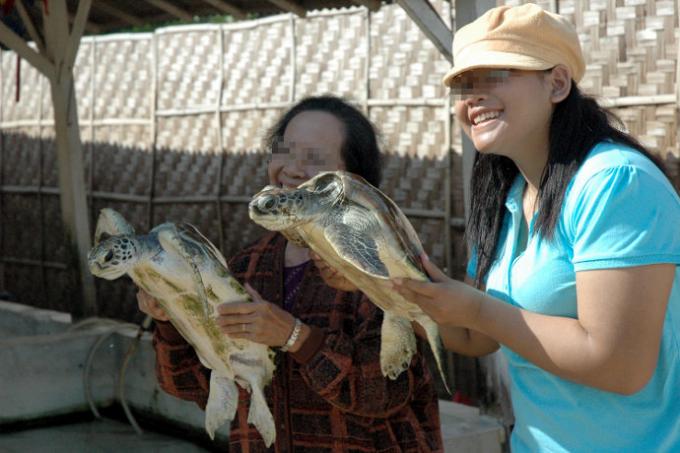- English
- Bahasa Indonesia
Don't Visit Tourism Places Exploiting Animals
Indonesia is a heaven for international tourists who fancy beautiful sceneries and diverse cultures. There are thousands places to visit including the internationally well-known tourism sites in Bali, Lombok, Yogyakarta and Papua.
However, some of these places exploit wild animals to attract more visitors. Using endangered animals in tourism will cause the animals suffer a.
Never visit the tourism places which exploit wild animals! If you visit these places, it is the same way that you will make the animal suffer more to entertain the visitors.
Which Tourism Places Exploiting Animals?
Sea Turtle Parks
These sea turtle parks can be found in Bali like in Tanjung Benoa and Nusa Dua. The endangered and protected sea turtles are kept in salt water ponds and visitors can take the poor marine animals for photographs. Worse, some parks let the visitors ride on the shell of the turtles. According to ProFauna's records, these sea turtles are illegally caught from the sea and eventually slaughtered for the meat.
Sea turtles hunting and trade is illegal. All sea turtles are protected by the Indonesian law. It means that the use of sea turtles in tourism is the same with sea turtle exploitation in the name of conservation. For more information about the sea turtle exploitation in Bali, please follow the link
Bird Markets
Bird markets can be found in almost all of the big cities in Java, Bali, Kalimantan, and Sumatera. Bird markets not only sell birds but also endangered species like gibbon, langur, orangutan, leopard cat, pangolin, and many more.
The animals being traded in bird markets suffer because of the inhumane treatment during the poaching, bad transportation, and bad handling. In addition, the hunting process is unsustainably cruel and causes death. Selling and buying endangered animals are illegal and violates the Indonesian wildlife act. Never buy wild animals in bird markets! It's cruel and a crime.
Animal Circus or Show
We often see animals star in a circus or show and we enjoy watching it. Sadly, we don't realize that behind the entertaining show there is lots of animal suffering. The animals are trained to entertain spectators in very cruel manners. They are forced by the trainers to do the circus or funny acts which causes them mentally and physically suffered. The animals have no choice. The only choices the have are between following the trainers or suffering/death.
Animal Fight
In some places in Bali, Sumatera, Flores, and Sulawesi, animal fight becomes tourism attraction. The animals used for this fight are usually goat, ox, and cock. Animal fight is cruel since the animals suffer and eventually die.
Hotel Displaying Endangered Animals
Some hotels in Indonesia display and keep endangered animals in cages or confinements. The animals being displayed are primates, parrots, and sea turtles. These animals suffer because they are fed not with their natural food and put in small cages. The hotel guests sometimes disturb them which make the animals get stressed.
Keeping endangered and protected species is illegal and violates the wildlife act. If you stay in hotel where there is endangered animal, please ask the hotel manager whether the hotel has the license from the authority to keep the protected animal and display it. Ask the manager where they buy the animal from. Buying protected animal is illegal.
Profane believes that the quality of a hotel is not decided based on whether the hotel keeps endangered animal or not. Hotels are valued based on the services to the customers. Displaying endangered animals is pointless. Furthermore, the hotel has to spend some money to take care of the animals. The animals are not happy either because they don't live in their natural habitats.

